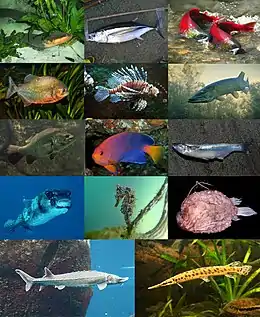Actinopterygii
The Actinopterygii is the class of ray-finned fishes.
| Ray-finned fish | |
|---|---|
 | |
| Scientific classification | |
| Domain: | Eukaryota |
| Kingdom: | Animalia |
| Phylum: | Chordata |
| Superclass: | Osteichthyes |
| Class: | Actinopterygii Klein, 1885 |
| Subclasses | |
| |
The ray-finned fishes get their name from the fact their fins are webs of skin held by bony or horny spines ("rays"). This is different from the fleshy fins of the fish in the Sarcopterygii. Ray-finned fish first appeared in the Silurian period.
Actinopterygians are the largest class of vertebrates. There are nearly 25,000 species. They can be found in both fresh water and marine environments from the deep sea to the highest mountain streams.
Most of the living species are teleosts, which are late-comers to the fish domain. The first teleosts are in the Mesozoic era, yet now they make up 96% of all fish.[2]
Taxonomy
- Chondrostei (bichirs and sturgeons)
- Neopterygii
- Holostei (gars and bowfins)
- Teleostei
- Osteoglossomorpha
- Elopomorpha (eels)
- Clupeomorpha (herrings, anchovies)
- Ostariophysi (goldfish, minnows, catfish, electric eels)
- Protacanthopterygii (salmon, trout, pike)
- Stenopterygii
- Cyclosquamata
- Scopelomorpha
- Lampridiomorpha
- Polymyxiomorpha
- Paracanthopterygii (cod, anglerfish)
- Acanthopterygii (mullets, flying fishes, sticklebacks, seahorses, flatfish, cichlids, mackerel, tuna, perch)
References
- Zhao, W.; Zhang, X.; Jia, G.; Shen, Y.; Zhu, M. (2021). "The Silurian-Devonian boundary in East Yunnan (South China) and the minimum constraint for the lungfish-tetrapod split". Science China Earth Sciences. 64 (10): 1784–1797. Bibcode:2021ScChD..64.1784Z. doi:10.1007/s11430-020-9794-8. S2CID 236438229.
- R. Froese; D. Pauly, eds. (February 2006). "FishBase".
Wikimedia Commons has media related to Actinopterygii.
Wikispecies has information on: Actinopterygii.
This article is issued from Wikipedia. The text is licensed under Creative Commons - Attribution - Sharealike. Additional terms may apply for the media files.